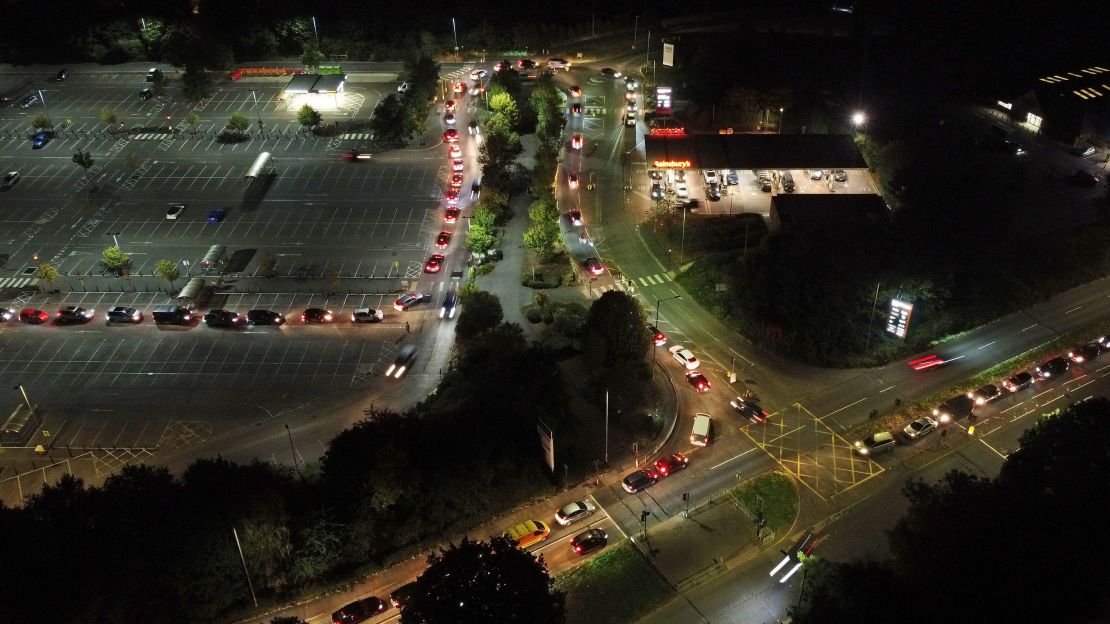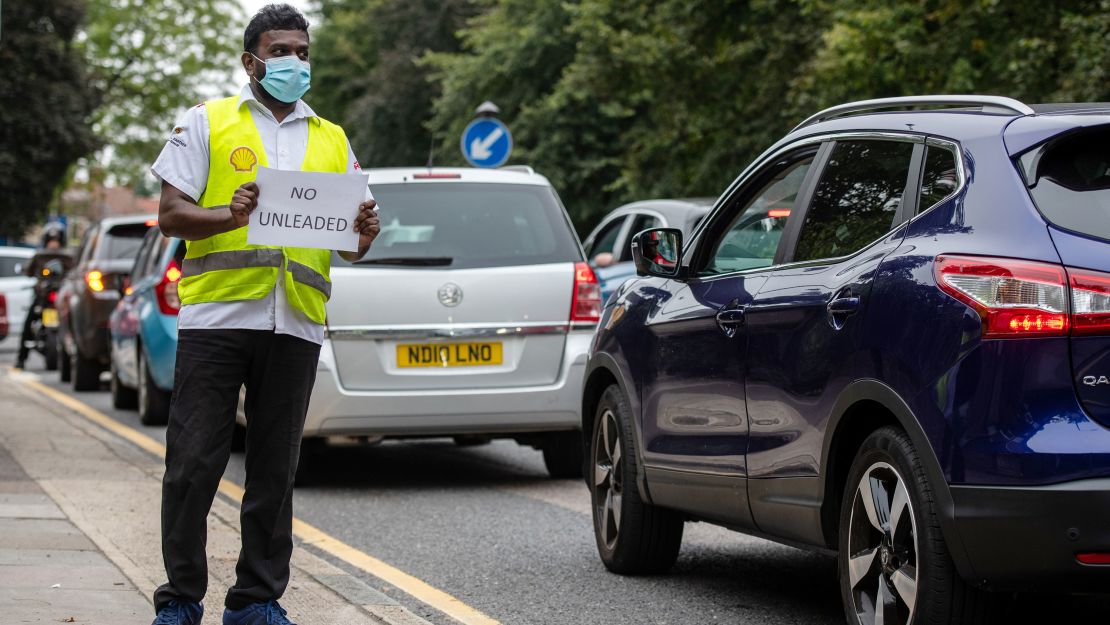As well as dropping people off at nightclubs, train stations and shopping centers, David Lawrie’s taxi drivers are relied upon to transport disabled passengers, and drive children to school. But as fuel stations across the UK run dry, those drivers are having to make difficult decisions about who does and doesn’t get to travel.
The UK military is on standby to deliver gasoline to service stations after a shortage of truck drivers forced some to close last week, triggering a spate of panic buying by British motorists. Drivers have been forced to wait in line for hours at the pumps that are still open, and local media has reported instances of violence between irate customers as tensions rise.
But people who don’t drive might be the most disadvantaged.
“The taxi industry takes the disabled passengers, and special education needs children to school, and doctors and nurses that don’t drive, or when their car’s broken down – it is a vital community service that is 100% fuel dependent,” Lawrie, director of the National Private Hire and Taxi Association, told CNN Business.
Lawrie said he had heard reports of taxi drivers in the English city of Colchester, who had to stop driving over the weekend in order to conserve fuel so they could ensure they would be able to transport students with special educational needs this week.
“We’ve got pensioners that are housebound, because we can’t get to them,” he added.
Some drivers attempting longer trips have been forced to abandon their cars after running dry, while essential workers have reported not being able to do their jobs without fuel.
The British Medical Association (BMA) on Monday called for emergency measures to allow healthcare staff priority access to fuel, warning that “there is a real risk that NHS [National Health Service] staff won’t be able to do their jobs, and provide vital services and care to people who urgently need it.”
“While the Government has said it is putting plans in place to alleviate the shortage of HGV [truck] drivers to transport fuel, the results of this won’t be immediate. Healthcare and essential workers must therefore be given priority access to fuel so they can continue their crucial work and guarantee care to patients,” Dr. Chaand Nagpaul, BMA council chair, said in a statement.

‘Disabled people are really worried’
The long lines and confusion are causing extra stress for people with disabilities.
Emma Vogelmann, who has spinal muscular atrophy and uses a ventilator via a tracheostomy, told CNN Business on Tuesday that her carer contacted her to say she couldn’t see her if she didn’t get petrol.
“It’s a really stressful situation for her and for me trying to figure out if she was going to be able to get here for a shift,” Vogelmann, lead policy adviser for disability equality charity Scope, added.
Eventually, her carer was able to find fuel, but disabled people across the country are facing similar stresses.
“Disabled people are really worried that their carers won’t be able to get to them. There have been a couple of people getting in touch with me to say that their carers for have only just been able to get to them,” Vogelmann said.
She urged people who are filling up their tanks unnecessarily to think about the impact it has on others.
Workers could suffer
Motorists are also worried about how they will get to work.
“Right now, I have enough petrol but if I don’t find any today or tomorrow, I can imagine not being able to take my car and that will turn my 25-minute journey into possibly about an hour and a half,” medical student Priyanka Oza told CNN Business on Monday, adding that the greater London hospital she works at is poorly connected via public transport.
“I have to take a few buses, or even go into central [London] and come back out.”
Lawrie said that if the problem isn’t resolved soon, workers who rely on fuel for their livelihoods will suffer.
“If there isn’t fuel there isn’t any income because we don’t use fuel to get to work we use fuel for work. So if we can’t drive, we can’t pick passengers up, but if we can’t pick passengers, we have no income. So it’s a massive problem,” Lawrie added.

Worker shortages are a growing problem in Britain, which has a record 1 million job vacancies. The shortage of truck drivers has been exacerbated by the pandemic and Brexit, which resulted in tens of thousands of EU nationals leaving trucking jobs and other occupations in the United Kingdom.
Gordon Balmer, executive director of the The Petrol Retailers Association [PRA], which represents independent fuel suppliers, said in a statement to CNN Business that there were “early signs” that the crisis at pumps is ending, with more PRA members reporting that they are taking further deliveries of fuel.
“Fuel stocks remain normal at refineries and terminals, although deliveries have been reduced due to the shortage of HGV drivers,” he said, adding that a survey of members conducted Tuesday morning revealed “only 37%” of forecourts reported being out of fuel.
“With regular restocks taking place, this percentage is likely to improve further over the next 24 hours,” he said.
Prime Minister Boris Johnson’s government has announced a series of emergency measures to address the fuel crisis, including issuing temporary work visas for 5,000 foreign truck drivers and suspending competition law to allow suppliers to deliver fuel to rival operators.
The government said Monday that British Army tanker drivers had been “brought to a state of readiness” and could be used to deliver fuel where it is needed most.
Correction: An earlier version of this story misstated the number of visas the United Kingdom is offering foreign truck drivers.
CNN’s Charles Riley and Chris Liakos contributed reporting.





















